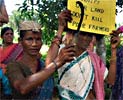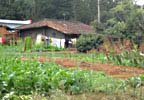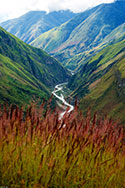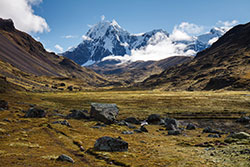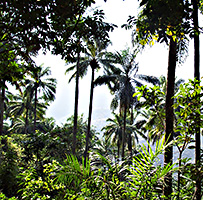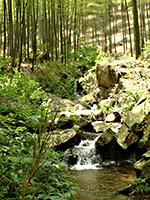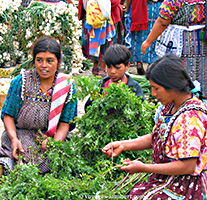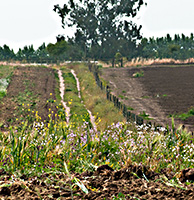A mountain village in Peru – around 1930 (1)
The road
“Indians complete their road”, “300 kilometres in 28 days”, “Right through the mountains”; the headlines of the newspapers in Lima (the capital of Peru) keep on celebrating. The unthinkable has happened: ten thousand Indians have together constructed a broad paved road, in just four weeks. And without any help or even initiative of the government, completely under their own power. So that trucks now can reach interior villages.
How did it happen? Well, simply because the Indians of the village Puquio felt provoked by the Indians from Coracora, who had begun to build a road to the coast. “Do they perhaps think that they can teach us a lesson?” said the Indians from Puquio angrily to each other. “As if we could not do that?” The varayok's, the mayors of the Indian neighbourhoods of the village, called a meeting, and decided after long debates that they also would build a road to the coast. The work would begin on the first of July, and would be completed on the 28th, just in time for the annual bullfight.
At the request of the varayok's the pastor made the plan public in his Quechua sermon the next Sunday. The mistis, the rich residents of the village, were immediately enthusiastic, because they understood quite well that they would profit most from the road. They provided crowbars, pickaxes, lamps, rock drills and dynamite. They also gave all a big amount of liquor and coca leaves. And with tears in their eyes they stood on the village place to see them off on the first of July.
In the meantime the varayok's had spoken to all villages in the surrounding area to rally as many Indians as possible, so that in the end there were ten thousand of them. The Indians from the coastal area began to work on the road from their side, so that they would meet midway in the mountains.
Early morning on the 28th of July, a truck drives into the village of Puquio. In the back platform of the truck are the varayok's. They are silent and serious-looking. When the truck enters the village plaza, where all the mistis are waiting to welcome them, one of the varayok's addresses them: “The road is ready. We have kept our word. Puquio is the boss. The Indians are the bosses.”
_______________________
Source
The marvellous novel Yawar Fiesta (Blood Festival, 1941) from the Peruvian writer José María Arguedas depicts the life of Indian peasants and farm labourers. As a child Arguedas lived for several years in an Indian family, and learned there to speak Quechua fluently.
Go to:
= part 2, the next page:
Misitu, the holy bull - a mountain village in Peru – around 1930 (2), story 80.
= the Table of contents, story 79.
